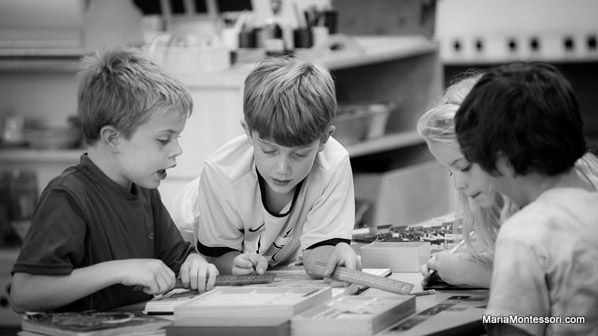
October 27, 2022
I look up from my desk work to see two Early Elementary children – a boy and a girl – entering my office. They enter quietly, but body language speaks of a certain excitement; one of them is clutching a book.
“We would like to read two poems if you are available,” one of them says. I come from behind my desk to sit and listen. One of the poems is about dolphins; the other is about insects. The children read aloud, taking turns with the verses. Clearly, they have made a plan and practiced how they will work together as readers.
After the readings, I ask the children how they had come to choose those particular poems. As it happens, each child chose a poem they really liked and the other one agreed to help them recite it.
In this very simple scenario, there is so much that is deeply, positively “Montessori elementary.” Here are a few of the things I see. The children are working from joy, not from coercion or a sense of duty. Working together they have attempted more and accomplished more than they would have done working alone.
Because they have been shown what it means to be fully prepared and how to practice, they have been able to prepare themselves. Because they are prepared, they have the self-confidence to risk offering poems to me.

Although the children are friendly with each other, their relationship in this case is based on their working together – on their shared love of poems. The boy, in particular, has not had to overcome cultural messages about poetry being a “girl thing,” because he is growing up in a closely aligned family and school culture that doesn’t carry those messages (just as it does not carry messages about math and geometry being “boy things”). There has been some give and take in the relationship – each child following and leading at different times during the process.
As Second Plane children, they are driven to explore language and its various powers, and they are being supported in that by being given positive avenues for exploration and opportunities at just the right level of difficulty to be challenging but not daunting. And, because they are working from personal choice, these explorations still feel like explorations to them, not like things they are being dragged into. When they are older they will not have to deconstruct the discomfort they have around poetry, disentangling feelings that are actually about poetry from feelings that are actually vestiges of fear, anger, or humiliation associated with the way educators heavy-handedly staged their early experiences of poetry.
As the children take their leave and I return to my work, I feel blessed for the ten-thousandth time to have been alive at just this time in just this place and to have had the opportunity to see the child through Montessori’s eyes.